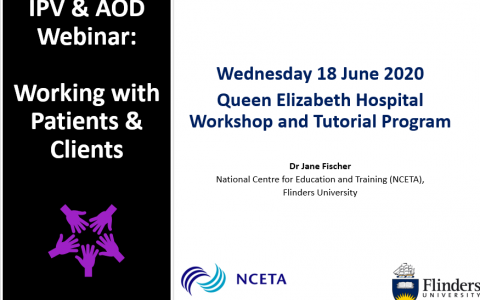Interpersonal Violence & AOD: Working with patients & clients
For the 5th consecutive year, NCETA has partnered with the Queen Elizabeth Hospital to conduct a one-day workshop for medical, nursing and allied health staff on identifying and responding to Intimate Partner Violence (IPV) and AOD use.
In previous years, the workshop has been conducted in face-to-face settings. However, in 2020, in response to Covid-19 restrictions, the workshop adopted a blended learning approach combining technology, digital media and online learning approaches with face-to-presentations and individual work activities.
The workshop, conducted by Dr Jane Fischer, comprised three stages:
- Groundwork – covered contextual issues e.g., defining IPV, prevalence, role legitimacy, and the relationship between IPV and AOD use. Participants were provided with information and asked to undertake individual activities. A short webinar also accompanied the provision of information.
- Working with patients and clients – e.g., asking through screening, assessing risk, options for responding. A webinar presentation highlighting practical strategies for identifying and responding to victims of IPV was delivered by NCETA’s Dr Jane Fischer.
- Moving forward – participants were provided with strategies to enhance worker safety when responding to IPV, information on referral options, guidance on information sharing. Participants were also provided with opportunities to contextualise their clinical experiences with women survivors of IPV and to review their own current and future practices.
A total of 25 people including health professionals and representatives from another hospital-based IPV training program participated in the workshop. Participants reported favourably on the blended learning approach adopted by NCETA and found the content to be relevant and applicable in their work environments. Examples of participants’ comments included:
- I found the content to be very interesting and really appreciated being given practical tips that I can use in my day-to-day work
- I particularly appreciated the suggestions about how to screen patients / clients for IPV
- Thank you for the detailed information and the links to additional information and where and how to refer patients / clients to relevant services
- I would strongly recommend this workshop to my colleagues.











